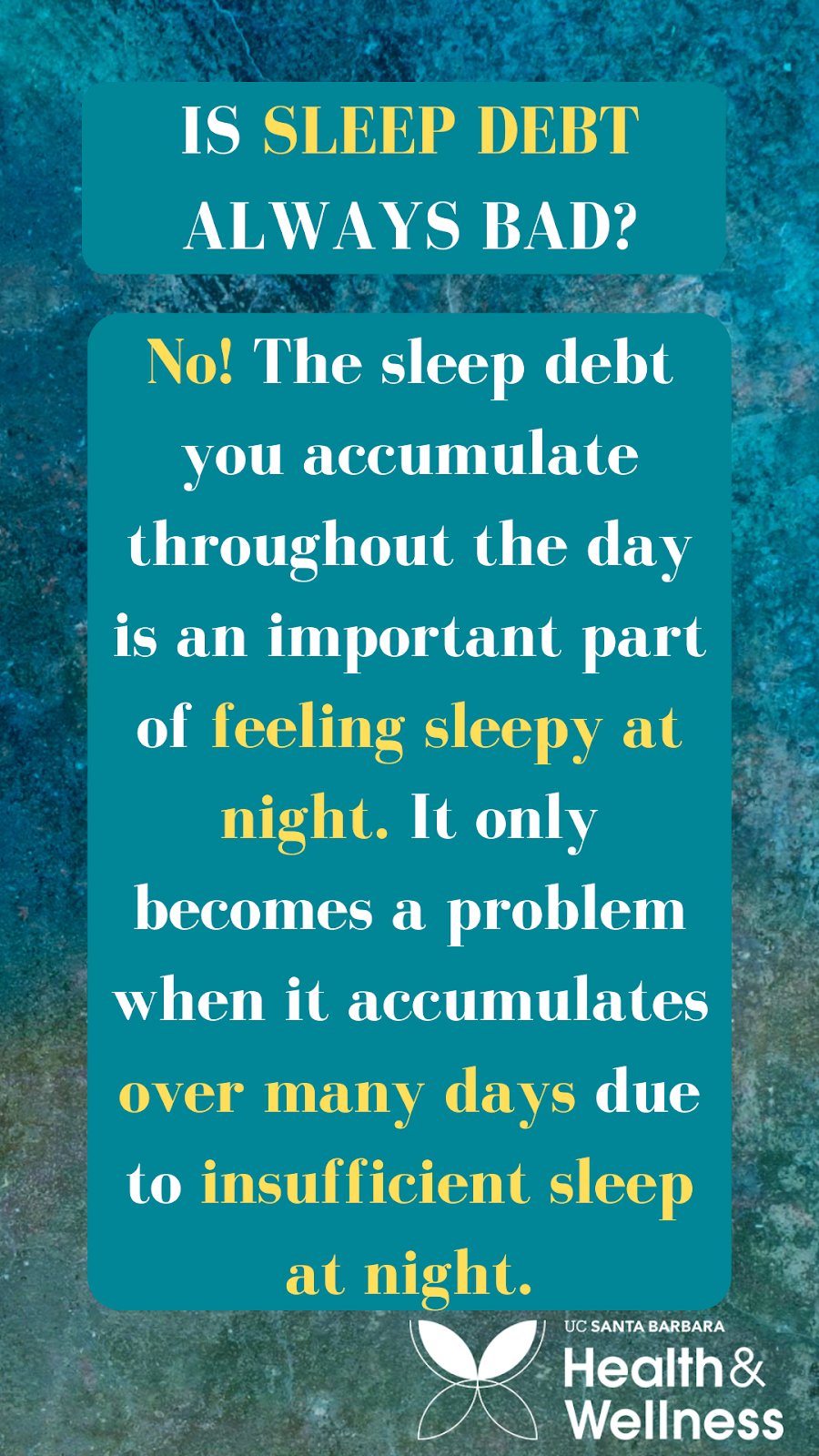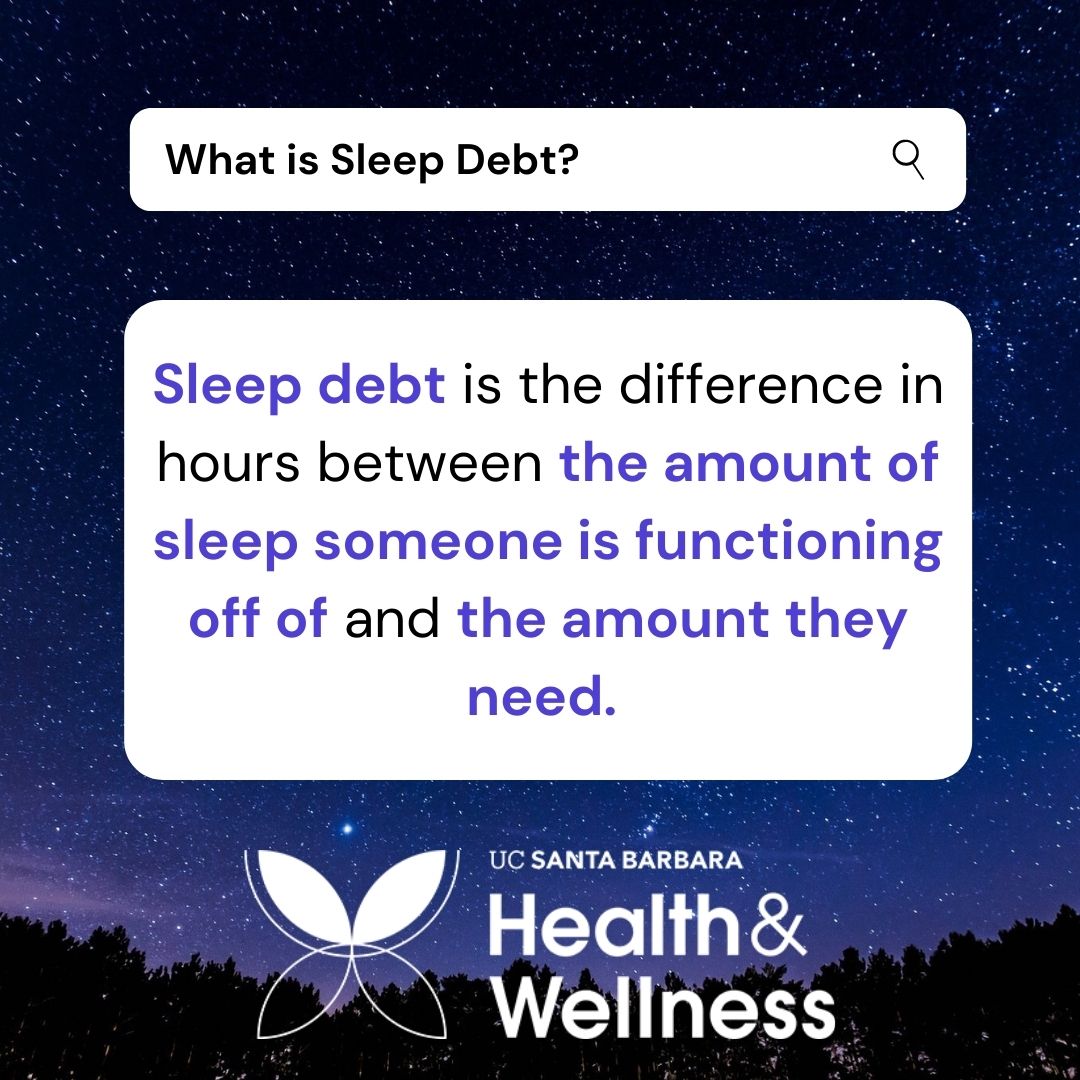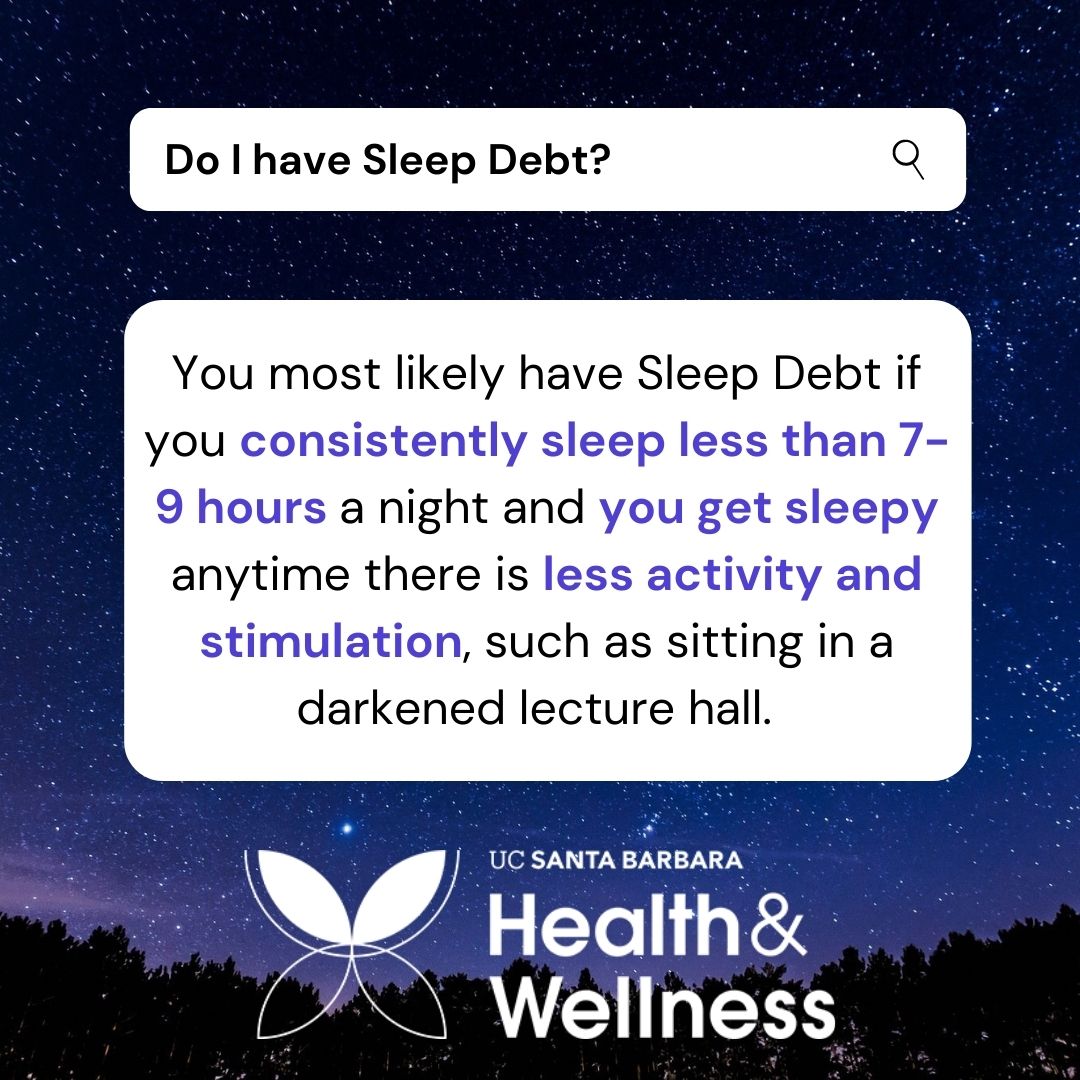
While many people feel they are able to “get by” on less sleep than their body needs, the truth is they are functioning with what we call “sleep debt.” When sleep debt is high, this negatively impacts alertness, learning, memory, and performance. (See the Memory and Learning module for more info on how to improve academic performance with sleep!)
Understanding how our biological clock works is foundational for understanding how we build sleep debt. It is the system working in the background that influences our feelings of sleepiness and wakefulness, which ultimately keeps track of the sleep debt we accumulate throughout the day. So what exactly is sleep debt and how does it affect us?
Sleep debt is the difference in hours between the amount of sleep someone is functioning off of and the amount they need. As sleep debt rises during the day, your biological clock alerts you to stay awake until later in the evening. The effects of our biological alerting system weaken midday which is why you often experience a period of decreased alertness after lunch time. This is also known as the “mid-day dip”usually between the hours of 1-3 pm.
Most undergraduates (ages 18-23) need about 7-9 hours of sleep on a regular basis, although it does depend on the person. If an individual is getting less than 7 hours of sleep, it is likely that they will have developed some sleep debt. However, we know that feeling rested is more than just how long you spend in bed.
There is both a quantity and a quality of sleep that come into play when we consider how rested we feel. For example, someone could be in bed for 8 hours but have many middle of the night awakenings that lead to poor quality rest. The terms sleep deficiency and sleep insufficiency capture the interplay between the quality and quantity of sleep that leads to whether we feel rested the next day.
Sleep Foundation. (2021, June 24). Sleep deprivation. Sleep Foundation. https://www.sleepfoundation.org/sleep-deprivation.
Reflect on a night of poor sleep you had recently. How did you feel the next day? Some of us may think we feel fine after a night of limited sleep, especially when engaged in a lot of activity or excitement. However, most often, when activity levels are reduced (i.e. a darkened lecture room, monotonous activity, or sitting as a passenger in a car), sleep deficiencies will be revealed when you begin to doze off or completely fall asleep (intentionally or otherwise). You might blame a boring lecture or the heavy meal you ate, but the more likely explanation is the effects of accumulated sleep deficiencies.
It is completely normal to have a bad night of sleep every now and then, even if you gave yourself a sufficient opportunity to sleep. However, in his book, Why We Sleep, Dr. Matthew Walker reminds us that we can not accumulate sleep debt without paying a biological penalty. Because there are so many vital processes going on when we sleep, such as memory consolidation or our brain's nightly function of ridding the body of toxins, if we don’t sleep the amount we need our brain can’t simply catch up on these vital processes during the weekend. Your body needs sufficient quantity and quality rest every night to engage in the vast biological processes that happen during sleep. For more info on this topic, check out our Sleep and Health module.
it is important to give yourself a sufficient sleep opportunity every night, but possibly even more so on school nights. In a study of 133 undergraduates at Harvard Medical School, Dr. Robert Stickhold showed that repaying sleep debt is not possible when it comes to memory and learning. He tested this by having students learn a visual memory task through repetition. Then participants returned to his lab with varying degrees of sleep (between 1-3 nights) and were tested on memory retention. Not only did 1 full night of sleep boost memory retention but “the more nights of sleep participants had before they were tested, the better their memory was.”
Juxtapose this with the sleep deprived group, who also learned a memory task on day 1 but were then deprived of sleep that night. They were then given two full recovery nights of sleep and asked to come into the lab. Interestingly, these students showed “absolutely no evidence of a memory consolidation improvement” even after repaying their sleep debt! Dr. Stickgold concluded “if you don’t sleep the very first night after learning, you lose the chance to consolidate those memories, even if you get lots of catch-up sleep thereafter.”
Walker, M. (2017). Chapter 4: Ape Beds, Dinosaurs, and Napping with Half a Brain: Who Sleeps, How Do We Sleep, and How Much? Why we sleep: Unlocking the power of sleep and dreams.(pp. 55-76). Simon and Schuster.

This information can be intimidating, and if you are running on long-term sleep deprivation, it may be difficult to break the cycle of chronic fatigue. The late Dr. William Dement, a founder in the field of sleep medicine, believed that catching up on sleep to break the cycle of chronic fatigue can make one feel better and set you up for creating a daily habit that doesn’t include accumulated sleep debt. If you are running on long-term sleep debt, he suggests that the first step is committing to getting as much rest as you need until your body is fully replenished. This might be more than just a couple of hours on the weekends, it may take a few weeks of extensive rest until you feel fully recovered.
Zhen Ang, J. Y. (n.d.). How much more will you achieve when you reduce your sleep debt?. End Your Sleep Deprivation. Retrieved July 2020, from http://www.end-your-sleep-deprivation.com/sleep-debt.html
It can be tempting to make up for lost sleep by sleeping much more than your body is used to. But oversleeping as a habit (for most people, this means frequently sleeping more than 9 hours) can actually increase levels of fatigue, even when an individual has acquired a fair amount of sleep debt. Oversleeping can lead to sluggishness, poor memory, depression, and a variety of different health conditions. The best way to combat sleep debt is to allow yourself many days throughout the week to catch up on sleep. Reversing the effects of sleep debt does take a little time and planning, but ultimately will better your physical and mental health.
Osmun, R. (2022, July 16). Oversleeping: The effects & health risks of sleeping too much. Amerisleep. Retrieved August 2, 2022, from https://amerisleep.com/blog/oversleeping-the-health-effects/
Everyone has a different sleep schedule, and thus suffers from different levels of sleep debt. There are many ways to increase awareness of one’s accumulated sleep debt. For example, the sleep challenge is designed to help you understand your personal sleep needs and provide suggestions for maintaining healthy sleep habits. By engaging with the challenge, you are taking the first step on the road to improving your sleep!
Tracking your sleep debt will help you understand how many hours of sleep you need to feel fully rested in the morning. Once you have a better idea of how much sleep debt you’ve acquired, you’ll be able to find a realistic window to fall asleep and wake up.
An excellent first step to figuring out your ideal sleep schedule is to understand your personal chronotype (are you a morning or evening person?). With this information, you will be able to conclude when it is best for you to wake up and go to sleep given your hours of productivity throughout the day. If you are interested, take the "circadian rhythm” type quiz.
LONG TERM: The amount of sleep necessary to support an individual also changes throughout a lifetime. Naturally, the body’s internal clock shifts to a later wake up time after puberty, which peaks at age 20. Our circadian rhythm shifts as well. The older we get, the more our body’s internal clock shifts to the earlier side. Remember to listen to your body throughout the many phases of sleep change, and adjust when necessary.
Roenneberg, T., Kuehnle, T., Pramstaller, P. P., Ricken, J., Havel, M., Guth, A., & Merrow, M. (2004). A marker for the end of adolescence. Current biology : CB, 14(24), R1038–R1039. https://doi.org/10.1016/j.cub.2004.11.039



This work is licensed under a Creative Commons Attribution 4.0 International License.